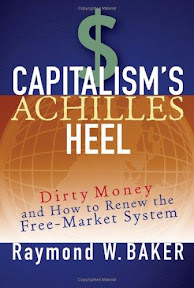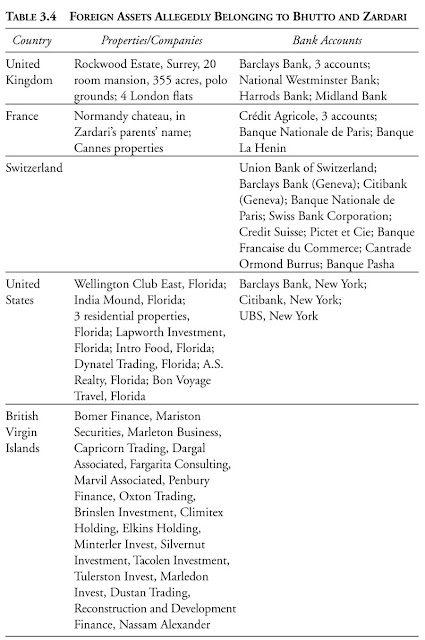|

Benazir Bhutto on pages 77-82:
Born in Karachi in 1953 and educated in
private schools, Benazir Bhutto graduated from Radcliffe College at Harvard
University in 1973. Going on to Oxford for a master’s degree, she displayed
her budding political skills and was elected president of the Student Union
in 1977. Meanwhile, her father had become prime minister of Pakistan in 1971,
was ousted in a military coup in 1977, and was executed in 1979 on charges
of conspiracy to commit murder. In and out of prison and house arrest,
Benazir was not allowed to leave the country until 1984 but then returned
to lead the democracy movement two years later. Her father’s usurper,
General Muhammad Zia ul-Haq, was killed in a mysterious plane crash in
1988, which also took the life of the U.S. ambassador Arnold Raphel, and
the head of the U.S. military aid mission to Pakistan, General H.M. Wasson.
Benazir was elected prime minister that year, served until her ouster in
1990 on charges of corruption and nepotism, was reelected in 1993, and
ousted again in 1996, amidst more charges of corruption. During her two
terms in office and since, what has come out portrays Bhutto and her
husband Asif Ali Zardari as world-class thieves.
Upon taking office in 1988, Bhutto reportedly appointed 26,000 party hacks
to state jobs, including positions in state-owned banks. An orgy of lending
without proper collateral followed. Allegedly, Bhutto and Zardari “gave instructions for billions of rupees
of unsecured government loans to be given to 50 large projects. The loans were sanctioned in the names of ‘front men’ but
went to the ‘Bhutto-Zardari combine.’ ” Zardari suggested that such loans
are “normal in the Third World to encourage industrialisation.” He used 421 million rupees (about £10 million) to acquire a
major interest in three new sugar mills, all done through
nominees acting on his behalf. In another deal he allegedly received a 40 million rupee kickback on a contract involving
the Pakistan Steel Mill, handled by two of his cronies. Along the
way Zardari acquired a succession of nicknames: Mr. 5 Percent, Mr. 10
Percent, Mr. 20 Percent, Mr. 30 Percent, and finally, in Bhutto’s second
term when he was appointed “minister of investments,” Mr. 100 Percent.
The Pakistan government’s largest source of
revenues is customs duties, and therefore evasion of duties is a national
pastime. Isn’t there some way to tap into this major income stream,
pretending to fight customs corruption and getting rich at the same time?
Of course; we can hire a reputable (or disreputable, as the case may be)
inspection company, have the government pay the company about a one percent
fee to do price checking on imports, and get multimillion-dollar bribes
paid to us upon award of the contracts. Société Générale de Surveillance
(SGS), headquartered in Switzerland, and its then subsidiary Cotecna, the biggest group in the inspection business,
readily agreed to this subterfuge.
Letters in 1994 promised “consultancy fees,” meaning kickbacks, of 6 percent and 3
percent to two British Virgin Island (BVI) companies,
Bomer Finances Inc. and Nassam Overseas Inc., controlled by Bhutto and Zardari.
Payments of $12 million were made to Swiss bank accounts of the BVI companies. SGS allegedly has paid kickbacks on
other inspection contracts around the world. Upon being accused in the
inspection kickback scheme, Bhutto sniffed, “I ran the government to the
best of my honest ability. And I did it for nothing but acknowledgment and
love.”
Then there was the 1994 deal to import $83 million worth of tractors from
Poland. Ursus Tractors allegedly paid a 7 percent commission to another of Zardari’s Caribbean companies, Dargal
Associated. Bhutto waived import duties on the tractors, costing the Pakistani government some 1.7 billion rupees in
lost revenues. Upon discovery of this scheme the Poles
hastened to turn over 500 pages of documentation confirming the kickback.
The Polish tractor deal was just a warm-up
for the French fighter jet deal. After the U.S.
government cancelled a sale of two squadrons of F-16s, Bhutto dangled a $4
billion contract for Mirages in front of the French—Dassault Aviation; Snecma, the engine manufacturer; and Thomson-CSF, producer
of aviation electronics. Without missing a beat they allegedly agreed to pay a “remuneration” of 5 percent to Marleton Business S.A., yet another of Zardari’s British
Virgin Island companies. This would have
generated a tidy $200 million for the Bhutto-Zardari couple, but
unfortunately for them she was driven from office before they could
collect.
Ah, but the gold deal gave some comfort to
these aspiring kleptocrats. Gold is culturally important in the Asian
subcontinent, in particular as a way for women to accumulate wealth.
Upwards of $100 billion is invested in this unproductive asset in Pakistan,
India, and surrounding countries. Smuggling is big business.
Ostensibly to regulate the trade, a Pakistani
bullion dealer in Dubai, Abdul Razzak Yaqub, asked Bhutto for an exclusive
import license. In 1994, yet another Zardari offshore company, M.S.
Capricorn Trading, was created in the British Virgin Islands. Later in the
year, Jens Schlegelmilch, “a Swiss lawyer who was the Bhutto family’s
attorney in Europe and close personal friend for more than 20 years,”
opened an account for Capricorn Trading at the Dubai branch of Citibank.
According to a 1999 U.S. Senate report: “Mr. Schlegelmilch did not reveal
to the Dubai banker that Mr. Zardari was the beneficial owner of the PIC
[private investment company], and the account manager never asked him the
identity of the beneficial owner of the account. . . . Shortly after
opening the account in Dubai, Mr. Schlegelmilch signed a standard referral agreement with Citibank
Switzerland private bank guaranteeing him 20 percent of the first three
years of client net revenues earned by the bank from each client he
referred to the private bank.” In other words, Citibank was contracting to pay a finder’s fee for millions
brought in from dubious sources. Citibank went on
to open three accounts in Switzerland for Zardari, with Schlegelmilch as
the signatory.
In October 1994, Citibank records show that $10 million was deposited into
Capricorn’s Dubai account by Razzak Yaqub’s company, A.R.Y. International
Exchange. In December, Razzak Yaqub received an
exclusive import license and proceeded over the next three years to ship
more than $500 million in gold to Pakistan. Additional
deposits flowed into the Dubai and Swiss Citibank accounts, and funds also
were shifted to Citibank Channel Island subsidiaries. The original ceiling on the accounts of $40 million was
reached quickly
Toward the end of her second term, the
Bhutto case took a bizarre turn. Representatives of
the Pakistan Muslim League, an opposition
party, met in 1995 with private investigators in London who offered documentary proof from an unnamed source of Bhutto’s
corruption, in return for a modest fee of $10 million. That deal was not consummated, but two years later, with
Bhutto out of office and under investigation, the offer was reportedly concluded for $1 million. The documents “appeared to have been taken from the Geneva
office of Jens Schlegelmilch.”
In 2000 Pakistan’s National Accountability
Bureau, with the thankless task of investigating corruption, drew upon
these documents and other sources and released details of assets and
accounts belonging to Bhutto and Zardari. Even to jaded observers, the
scale of their holdings was stunning: hundreds of properties, dozens of companies, and dozens of bank accounts. A partial listing of
only foreign holdings reported by the National Accountability Bureau is
provided in Table 3.4.

Summarizing this and other documentation, the New York Times
reported that the material included “. . . letters from executives
promising payoffs, with details of the percentage payments to be made;
memorandums detailing meetings at which these ‘commissions’ and ‘remunerations’
were agreed on, and certificates incorporating the offshore companies used
as fronts in the deals. . . . The documents also revealed the crucial role
played by Western institutions. Apart from the companies that made payoffs,
and the network of banks that handled the money . . . the arrangements made
by the Bhutto family for their wealth relied on Western property companies,
Western lawyers and a network of Western friends.”
Even the Swiss finally had had enough.
Seventeen bank accounts linked to Bhutto and Zardari were frozen. The two
were charged with money laundering in connection with bribes received from
the inspection company SGS and were convicted by a Swiss court in 2003,
with fines and suspended prison sentences. This was short-lived; the
decision was overturned and referred back to cantonal prosecutors upon
appeal. Meanwhile, Zardari was in prison in Pakistan from 1996 to 2004 on
assorted charges.
Bhutto, with her father executed, two brothers assassinated,
her mother an amnesiac, her husband still troublesome, and she living in
exile between London and Dubai, portrays herself as the victim: “I never
asked for power. I think they [the Pakistani people] need me. I don’t think
it’s addictive. You want to run away from it, but it doesn’t let you go. .
. . I think the reason this happens is that we want to give love and we
receive love.” Save your tears. In the global collection
of displaced leaders, Benazir Bhutto may be the least sympathetic character
of all.
|